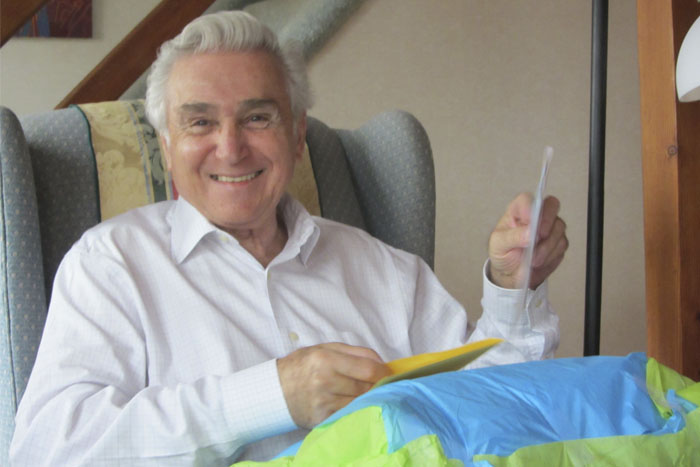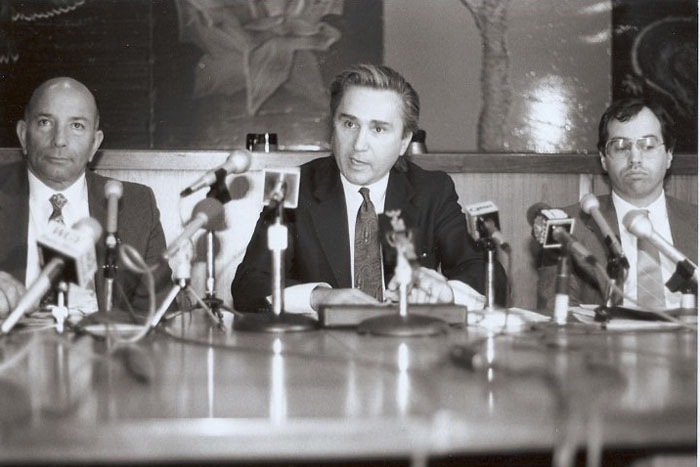
Maurice Hinchey today.
The family of former New York congressman Maurice D. Hinchey, whose career in the U.S. House of Representatives and the New York State Assembly spanned 38 years, has announced that he has a rare, terminal neurological disorder known as Frontotemporal Degeneration (FTD). The congressman was diagnosed with FTD following a difficult but successful battle with colon cancer.
FTD is a progressive and fatal neurological disease that gradually damages the brain’s frontal and temporal lobes. It is characterized by a slow decline in behavior, language, and/or movement, with memory usually relatively preserved, according to the Pennsylvania-based Association for Frontotemporal Degeneration. The condition is often initially misdiagnosed as Parkinson’s disease, Alzheimer’s, or a personality disorder. There is currently no known cure or treatment to slow or stop the progression of FTD.
Hinchey’s symptoms began as the occasional lost word, and within a relatively short time a variant of FTD began to further affect his language skills. As his language decline progressed over the past several years, Hinchey traveled and enjoyed retirement with his family at his home in Saugerties.
Eventually, he began experiencing additional symptoms of FTD, including Parkinsonian Syndrome, which presents symptoms similar to Parkinson’s disease, such as difficulty with walking, balance, and stiff muscles.
Ilene Marder Hinchey, the congressman’s wife, said the Hinchey family was astonished to discover how relatively few people, including some in the medical profession, knew about FTD and its variants.
“Knowing Maurice and his heartfelt desire to always help others, we know he would want to do everything possible to help raise awareness of this debilitating and terminal disease, and to understand its symptoms and progressions so families can plan for the long-term care necessary for this incredibly complex condition,” Marder Hinchey said. “We strongly support additional federal and private funding for research to treat and eventually cure FTD, and we support additional resources to help families care for their loved ones at home on a long-term basis.”
The Association for Frontotemporal Degeneration is at the forefront of the battle, said Marder Hinchey, and much remains to be done. “We’re proud to be working with and on behalf of this community, and grateful for families like the Hincheys, who are willing to share their experience,” said AFTD CEO Susan L-J Dickinson. “Such efforts can bring new attention crucial to the development of therapeutics and management strategies for FTD, progress that can benefit all sufferers of neurological disorders.”

Hinchey chairing an Assembly committee in his early Albany days.
Congressman Hinchey was born in Greenwich Village and grew up in Saugerties. He is now 78 years old and is being cared for at his home in Saugerties by his wife, family, and team of caregivers. He greets every day as a new challenge and has a warm smile for everyone who visits.
Hailed as the “environmental hero of the Hudson Valley”, and known widely as “a tireless champion of working families,” Hinchey’s leadership of the environmental and human-rights movements led to many of the first state and national laws protecting water, air, land, and historic resources, and promoting economic equity for working families.
Hinchey served 18 years in the New York State Assembly (1975-1992). For much of that time, he was chairman of the Environmental Conservation Committee, known for his landmark investigative work on Love Canal, and for his successful ten-year investigation into organized crime’s illegal dumping of toxic waste that led to the conviction of more than 20 criminal figures.
First elected to Congress in 1992, he served for 20 years. As a member of the Appropriations Committee, he continued to lead the fight for equal rights, clean energy, equitable taxes, sustainable jobs, equal pay, and preservation of natural resources. He led the fight to force GE to clean up the 1.3 million pounds of PCBs it dumped into the Hudson River between 1947 and 1977, and is responsible for the creation of the Hudson River Valley National Heritage Area. He brought back millions of dollars in federal funding to the communities he represented to expand infrastructure, upgrade historic sites, improve schools, and more.
A long-time advocate of universal health care, Maurice Hinchey felt one of his proudest votes was the one he cast to pass the Affordable Care Act.

As a NY State Assemblyman c. 1970s – 1980s.

Congressman Hinchey served all of us very well during his time in office. He was champion of many causes, some of them visionary, many unpopular. I never understood why he wasn’t given a greater role in a leadership position in Congress (and yes, he was flawed as we all are).
I miss seeing him almost everyday enjoying breakfast with his friends in uptown Kingston. Go well Maurice–
Orphan diseases make sufferers thereof like, well orphans. The only area of this world that seems to be doing anything in this regard is Europe. This nation could be doing more, but we fund diseases at NIH in the stupidest way imaginable, rather than on the basis of biology, based on the name of the disease and according to the most people that have it.
The only question I have is which one of us is going to go first. Maybe this should be a raffle to benefit orphan disease research!!!